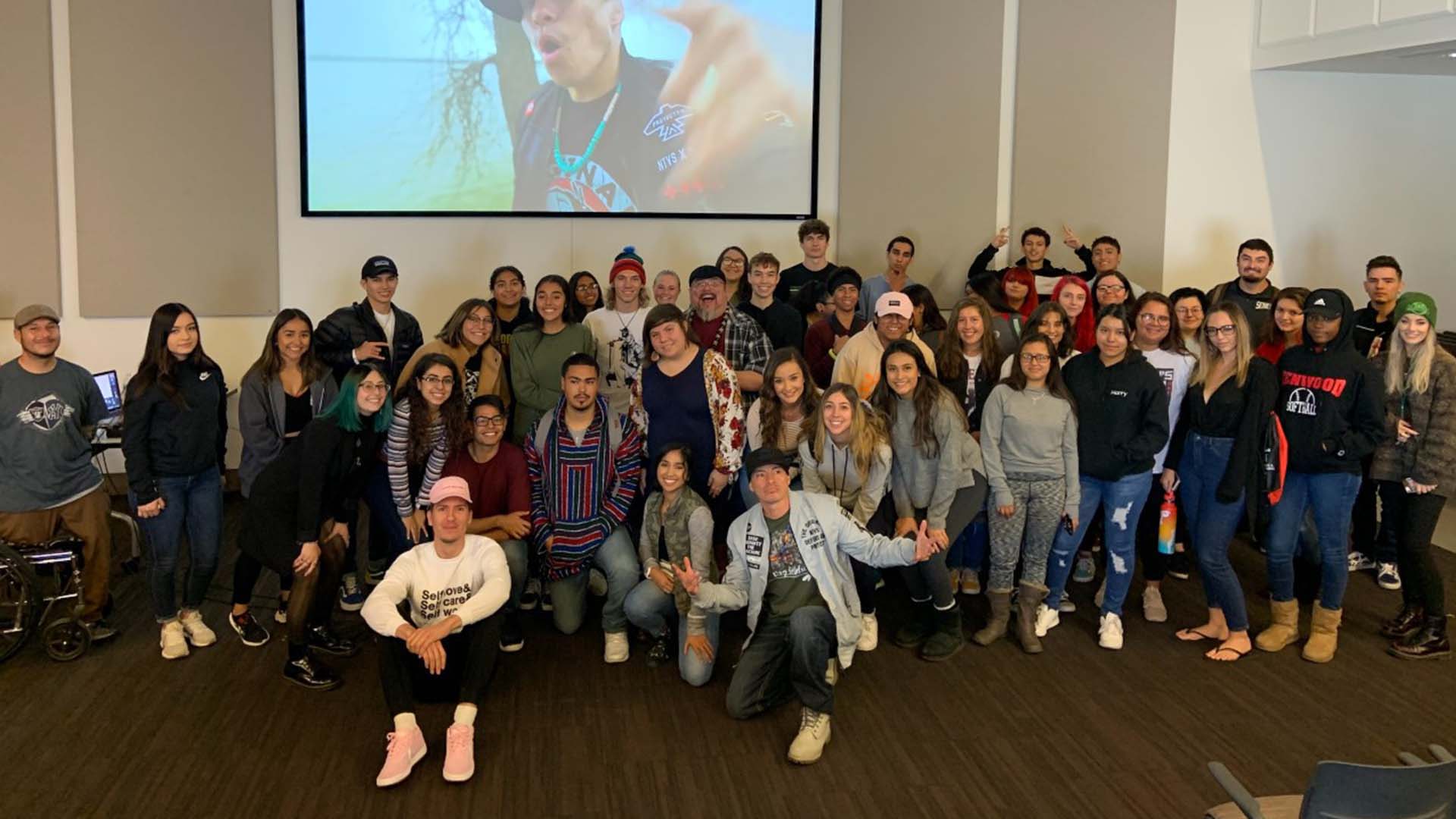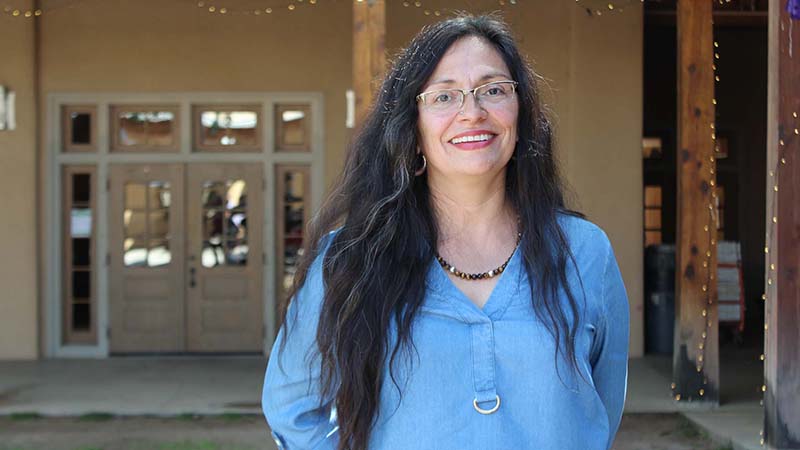
A $2 million grant from Mellon Foundation to The University of New Mexico helps bring students in the Humanities from Central New Mexico Community College and UNM branch campuses to the UNM main campus in Albuquerque where they engage with mentors on research projects. The program is led by UNM Professor Irene Vasquez. This is a major achievement for Humanities programs at UNM, which often lack large grant opportunities such as this Mellon grant, she said.
Most students come to the main campus as juniors, with one student was just short of junior-level status.
Vasquez explained that students selected for the Mellon summer academy and the undergraduate fellowship work closely with faculty to advance their Humanities research interests. Students receive a $2,000 fellowship during the academic year and a $2,000 fellowship to attend the Mellon summer academy. Students identify supportive faculty mentors who guide them in developing research questions and analyzing primary and secondary sources. Through these organized academic experiences, students gain awareness of humanities theories and methodologies. Students also receive professional development support, including how to create an academic CV and write abstracts.
The Mellon Foundations’ emphasis on social justice encourages faculty and students to think through critical and compelling issues affecting diverse populations. Jennifer Denetdale, professor of American Studies, advised Sarah Gehrke Sidelko, an American studies major.
“Sarah helped me research how historic photographs of Indigenous leaders shaped how an American audience thought they knew something about Indigenous leaders and governance,” Denetdale remarked. The pair studied Diné photographer and artist Will Wilson’s use of 19th century tintype photography to understand how Diné artists practice visual sovereignty, which means that “Diné exercise the inherent right to control narratives of the Diné through self-representation in film, media, performance, and photography,” Denetdale explained.
Student Rios Fernandez, who is currently developing a research project on the Chicana and Chicano Movement, worked with Jose Luis Serrano Najera, assistant professor of Chicana/o Studies. Fernandez is interested in understanding the lasting impact of Chicana and Chicano Movement ideas about culture, identity, and self-determination among post-Civil Rights era Chicana feminist intellectuals like Cherrie Moraga and Gloria Anzaldua, as well as LGBTQ activists Olga Talamante and Diane Felix.
“My research interests stem from my own community activism as a member of the Albuquerque chapter of La Raza Unida Party,” Fernandez said, who also “seeks to advance their understanding of the impact of Chicana/o/x assertions of culture, identity, and self-determination.”
CNM transfer students also worked with UNM professors on several different research projects. Gareth Miller studied Guatemalan birth mother testimonials with Department of Spanish and Portuguese associate professor Kimberle Lopez. Under the supervision of professor Anna Nogar, Maddie Hohn explored the legacy of Aurora Lucero, a major early 20th century Nuevomexicana writer. Marissa Montoya worked with associate professor of Linguistics Naomi Shin on assessing the significance of Spanish-English childhood bilingualism.
“… The student will be trained in best practices in conducting research with children in New Mexico and will participate in numerous scholarly activities,” Shin said.
Deanna Tenorio worked on a research project with Chicana/o Studies graduate assistant Brandy Reeves, and Gunnar Barnes worked on a research project with American Studies department professor Francisco Galarte. Tenorio is starting the MA in Lit program in English at UNM in the Fall 2022, and Barnes is currently participating in a summer internship at the American Philosophical Society Library and Museum in Philadelphia, for which Denetdale wrote him a recommendation. They both transferred at Junior-level status.

Vasquez, chair of Chicana and Chicano Studies and the director of the Southwest Hispanic Research Institute, is the lead PI for the Extending Humanities Pathways: A CNM and UNM Partnership for Innovation and Success initiative and will coordinate the grant and oversee the budget. Mark Peceny, UNM professor of Political Science, is the co-PI. In 2019, when he was dean of the College of Arts and Sciences, Peceny selected Vasquez as the lead PI to coordinate the writing and submission of the grant. This latest grant builds on the original grant.
UNM will receive $2 million over the course of three years to increase Humanities Bachelor of Arts degree earners at UNM, a Hispanic-Serving Research Institution. CNM, a partner in this endeavor, will receive $1 million to increase the number of Humanities degree earners.
“Students at community colleges who are interested in the Humanities need a path to see how they can use their passion as they move into a career. We always want students to fulfill their potential, and in the case of Humanities fields, that typically involves a bachelor’s or graduate degree. The grant provides that framework that will show students how they can move forward in the field of their choice,” said Laura Musselwhite, dean of Instruction and professor of History at the UNM-Valencia campus.
Students have the option to transfer to any Humanities department at UNM and the original Mellon grant did stimulate an incredibly important commitment to Native American Studies and Chicana and Chicano Studies, Vasquez said. CNM introduced AA degrees in Native American Studies, Chicana and Chicano Studies, and American Studies. These degrees are critical to UNM’s 2040 Plan.
Vasquez said students who earn Humanities degrees can go into a variety of careers. For example, during the first grant students met Humanities degree recipients who have gone into local and state government, education, business, non-profit work, and the visual arts.
“There is no limit to the possibilities of professional and career opportunities for students who obtain a Humanities degree,” Vasquez said. “My campus partners and I are celebrating the success of having received the Mellon grant because it will expand the constellation of Humanities learning opportunities that honor our students, the places they come from, their diverse cultural traditions, and the resiliency of people in the face of challenging circumstances or societal shifts.”
